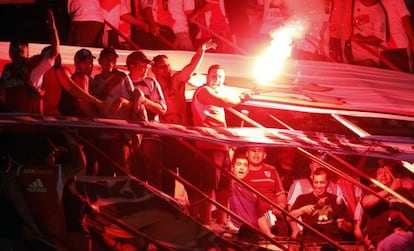Internal fan group battles grow fiercer at Argentina’s soccer clubs
Skirmishes between rival River Plate factions symbolize sport’s close ties with politics

On Thursday night River Plate and Boca Juniors fought it out for a spot in the final of this year’s Copa Sudamericana. It was the latest iteration of the long-running rivalry between these two Argentinean soccer teams, with River ultimately edging past Boca 1-0. But this time round a new factor fueled the usual tension, already heightened after the first leg of the semi-final clash ended in a 0-0 stalemate. On Tuesday, a brutal clash had erupted between members of two rival groups of River Plate fans, known as barras bravas, at the club’s offices.
Discord between Los Borrachos del Tablón and Los del Oeste is not new. Their conflict dates back to 2007 and had already led to one death and several injuries. But their latest dispute was especially serious and demonstrated that last year’s efforts by the new River Plate leadership to build a relationship with Los Borrachos had failed. In fact, River Plate president Rodolfo D’Onofrio admitted the mistake, saying: “We were wrong not to suspend the barras as members.”
The incident also serves as an example of what is going on with practically every fans group in Argentina, irrespective of level or region: since the 1970s these often violent organizations have developed close relationship with club leaders, politicians, police officers and even members of the judiciary. These multiplied in the 1990s, making it impossible to put an end to their activities as authorities did when similar crises erupted in England and Spain. “I do not want them to enter one prison door and then get out through another,” D’Onofrio said on Tuesday. The reality is, 24 hours after the incident, no one had been arrested. And the “revolving doors” do not lead to prison. They lead to club leaders and politicians, and vice versa.
Being a powerful barra member in one of the largest clubs opens the door to innumerable business opportunities
Born out of passion, the barras bravas slowly transformed over the years. On the one hand, the organizations turned “into a kind of task force that engages in the illegal use of violence and is run by the club leadership or politicians,” says Pablo Alabarces, a sociologist who studies the issue. On the other hand, they became a factory of criminal activity, which explains why the battles between rival groups of the same club are growing more fierce. These have replaced the old battles between fans of opposing teams.
Being a powerful barra member at one of the largest clubs opens the door to innumerable business opportunities, including scalping tickets that the club hands out to supporters; managing parking lots at stadiums and in nearby streets; setting up food stands; having a say in decisions about reserve and first-team players, and direct participation in transfer decisions. At the smaller clubs, members benefit from job placements in government offices or private businesses. But in both cases, they also fight over territory, whether it is for political power or to carry out a range of criminal activities, including drug trafficking. Impunity is always the main element that fosters the growth of these mafias.
Given this context, the incidents that have taken place over the last few weeks were not random. Four people have died and several more were wounded. Next year is an election year in Argentina and the fight to control the strings on the field foreshadow the battle at the polls, where a clear front runner has yet to emerge. But there is one coincidence. Mauricio Macri and Sergio Massa, two of the main candidates in opposition to President Cristina Fernández de Kirchner, entered politics after serving as presidents of Boca Juniors and El Tigre, respectively. Meanwhile, Aníbal Fernández, a former cabinet chief and current senator, was president of Quilmes. Hugo Moyano, the secretary general of one of the most important unions in Argentina, continues to head Independiente. The president’s son, Máximo Kirchner, is involved in one way or another in everything that concerns Racing. And the list goes on ...
Translation: Dyane Jean François
Tu suscripción se está usando en otro dispositivo
¿Quieres añadir otro usuario a tu suscripción?
Si continúas leyendo en este dispositivo, no se podrá leer en el otro.
FlechaTu suscripción se está usando en otro dispositivo y solo puedes acceder a EL PAÍS desde un dispositivo a la vez.
Si quieres compartir tu cuenta, cambia tu suscripción a la modalidad Premium, así podrás añadir otro usuario. Cada uno accederá con su propia cuenta de email, lo que os permitirá personalizar vuestra experiencia en EL PAÍS.
¿Tienes una suscripción de empresa? Accede aquí para contratar más cuentas.
En el caso de no saber quién está usando tu cuenta, te recomendamos cambiar tu contraseña aquí.
Si decides continuar compartiendo tu cuenta, este mensaje se mostrará en tu dispositivo y en el de la otra persona que está usando tu cuenta de forma indefinida, afectando a tu experiencia de lectura. Puedes consultar aquí los términos y condiciones de la suscripción digital.








































